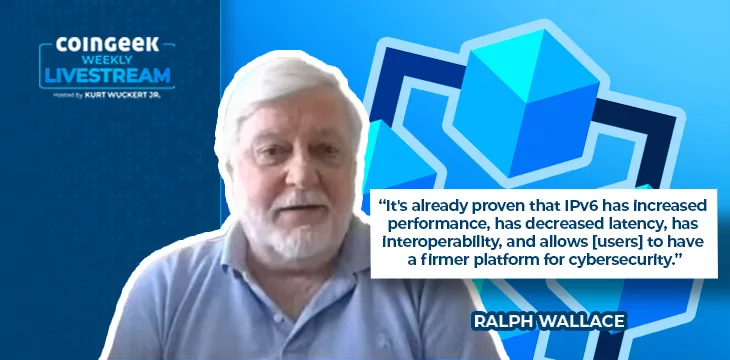|
Getting your Trinity Audio player ready...
|
On this CoinGeek Weekly Livestream episode, Kurt Wuckert Jr. talked to the Chair of the U.S. IPv6 Council, Ralph Wallace, about blockchain and IPv6 integration. What transpired was a fascinating conversation about the benefits of IPv6, how it can work with Bitcoin, and much more.
Introducing Ralph Wallace
Wallace attended the recent London Blockchain Conference, so his face will likely be familiar to anyone who tuned into the panels on IPv6 and blockchain. He tells Wuckert his life story in a nutshell; how he joined the navy as a young man, had a background in engineering, and subsequently went into the commercial space, where he helped people move from Banyan VINES to early versions of Windows.
When he was working in the commercial field, he heard about Internet Protocol Version 6 (IPv6) and thought it was a smart idea. Therefore, he focused on it and has been working to convince the U.S. government to adopt it ever since.
Was the consumer internet designed intentionally, or did it just evolve the way it is?
Wuckert starts the interview with a great question—did the internet evolve organically to be how it is, or was it steered in this direction?
Wallace answers that IPv4 only has 4.3 billion addresses, and early pioneers, including Vint Cerf, thought this would be enough. The internet was given over to the National Science Foundation, then the World Wide Web came about, and IP addresses became domain names like we’re familiar with today.
Wallace says that behind each website address is an IPv4 address, but they’re now exhausted—the 4.3 billion was never anywhere near enough. This is one of the reasons he works to help organizations transition to IPv6.
If you could rebuild the internet, what would it look like?
Wuckert asks Wallace what the internet would look like if he was given a trillion dollars and a magic wand to redesign it.
Wallace answers that everything the Internet Task Force has done is appropriate and accurate. However, most people don’t want to implement the transition to IPv6 as it’s technically difficult. All he’d want to do is get people to implement it and shut off the IPv4 internet for good.
Delving into how IPv6 differs from its predecessor, Wallace explains that a subnet of IPv4 addresses typically has 250 nodes. However, an IPv6 subnet could have 18 quintillion addresses—orders of magnitude more.
Are there other benefits to IPv6 aside from an increased number of addresses?
Wuckert notes that most people understand how an IPv6 internet would have lots more addresses, but he wonders if there are other benefits, too.
Wallace says he’s glad Wuckert asked that question, and the answer is yes. It’s already proven that IPv6 leads to increased performance and interoperability as well as decreased latency. This leads to fewer error rates and a firmer platform for cybersecurity.
IPv4 has a lot of holes in its design, and the people who have worked on IPv6 studied it and learned those lessons, Wallace tells us. He says that, despite this, IPv4 will be around for a long time, just as older generations still use paper checks, even with the advent of Internet banking and digital currencies.
Wallace’s Bitcoin story and why it’s symbiotic with IPv6
Wallace then tells us how he encountered Bitcoin. He was presenting on IPv6 at a conference in Montreal, Canada, and was on the stage with Dr. Craig Wright. He didn’t know much about Bitcoin or blockchain technology at this stage, but he noticed how his half of the presentation seamlessly carried on from Dr. Wright’s first half.
After talking with Dr. Wright more, Wallace realized that Bitcoin/blockchain is an app that rides on top of the internet and uses its plumbing. He also realized that Bitcoin is the “killer app” that makes IPv6 necessary.
The conversation then goes in the direction of miners and their purpose. Wuckert says he wants them to be considered ISPs—they process the vast amount of data that makes the web work. Wallace warns him that being tarred with the same brush as the likes of Verizon wouldn’t be a good thing; he suggests they are more like Tesla (NASDAQ: TXLZF) charging stations—service providers that are absolutely essential. Making people understand why they are necessary is the first important step, he says.
Questions from viewers
Wuckert then opens the livestream up to questions from viewers. There are several excellent questions, and readers should watch the livestream to hear answers. The following are three of the best viewer questions.
Q. Are there any unique challenges that IPv6 poses for blockchain implementation or operation?
Wallace answers that many challenges come from ISPs only using IPv4 addresses. Use IPv6, and many of them go away, he says.
Q. How does IPv6 fit into IoT and blockchain interplay?
“Separately,” Wallace answers. IoT is a network of cameras around a house, and IPv6 is great for this because it makes so many unique addresses available. He tells us that blockchain is different because you need a structured multicast system.
Q. Can IPv6 provide a solution to privacy concerns in Bitcoin transactions?
Wallace says it can, but that doesn’t mean it should. IP security is built in; although many machinations need to be in place, it can happen.
Watch: Sharing information via IoT—that’s the value

 02-25-2026
02-25-2026 




